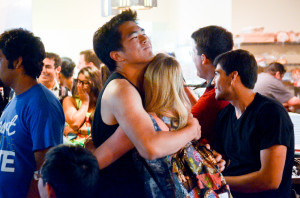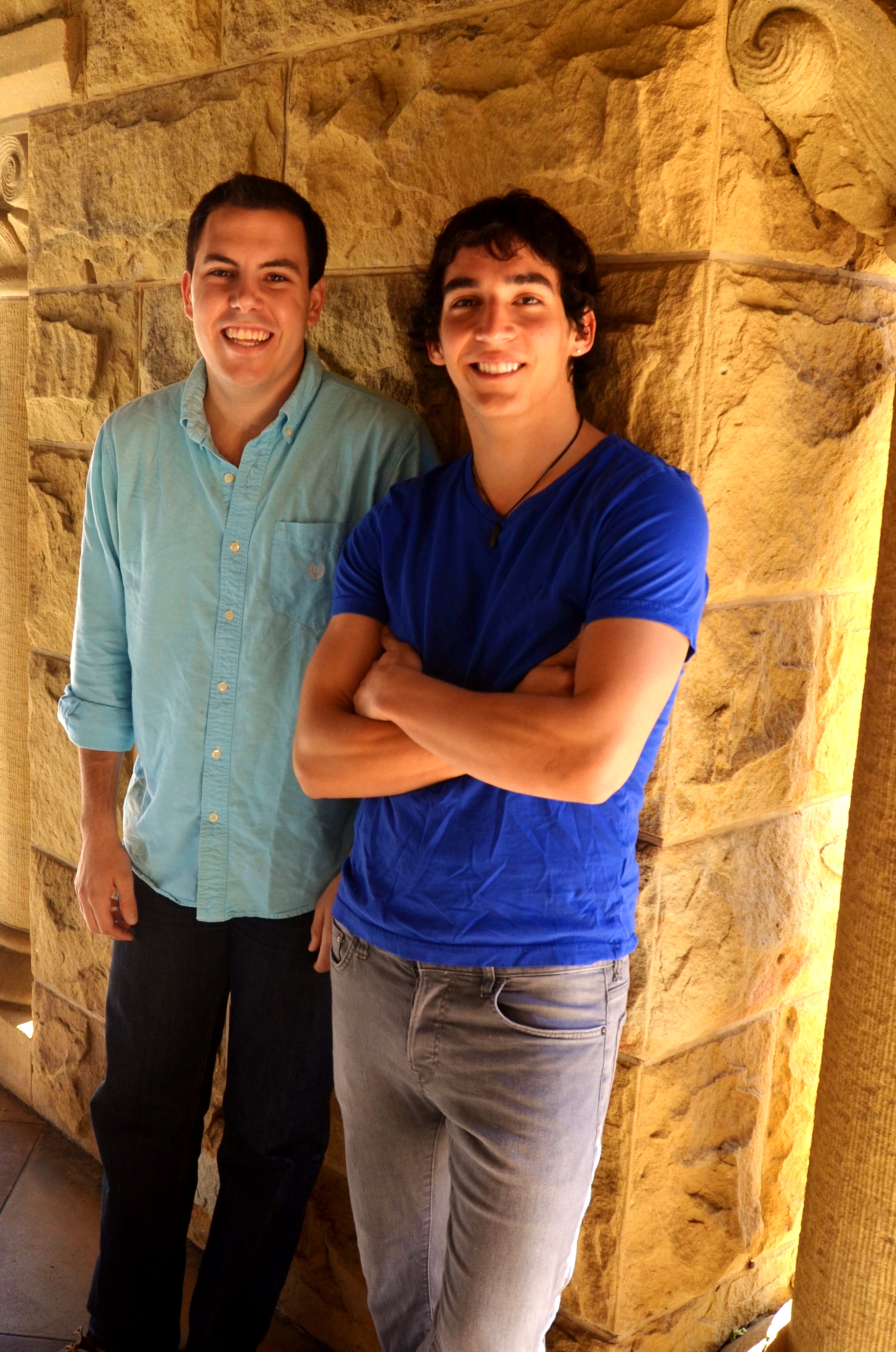Dan Ashton ’14 and Billy Gallagher ’14 have been elected as the 2013-14 ASSU Executive with 55 percent of the vote after two rounds of balloting, beating out Najla Gomez ’14 and Elizabeth Patiño ’14.
Around 50 students gathered at the CoHo at 5 p.m. on Saturday as ASSU Elections Commissioner Brianna Pang ’13 announced results. Gomez and Patiño sat at the foot of the stage during the elections party, while Ashton and Gallagher were away attending rush retreats for their fraternities.

The Chaparral slate of Anthony So ’14 and Ryan De Taboada ’14 received 214 votes.
The results are subject to Stanford Student Enterprise (SSE) audits of items like a $1,000 campaign spending limit for Executive slates. According to Pang, turnout increased by 2.2 percent from the 2012 ASSU elections.
“It was a good affirmation that the student body believes in our experience and our issues,” Gallagher said. “They supported us based on our experience and the issues and not because of any endorsing body.”
Buzz surrounded the final hours of voting in a mostly uncontroversial campaign as Ashton/Gallagher dropped their endorsement from The Stanford Review after the publication posted an opinions piece by Jason Lupatkin ’13 on Friday urging students to not vote for Students of Color Coalition (SOCC)-endorsed candidates. The column was pulled and modified slightly to remove racial language before being reposted.
According to Judith Romea ’14, editor in chief of The Stanford Review, the column’s initial removal happened due to technical difficulties and not at Ashton’s request, as had been claimed by the candidate. According to Romea, The Review stands by the column’s content.
“It was not supposed to be pulled,” she said. “We were having issues with [site host] WordPress, and we were live-updating it.”
According to former Review editor in chief Lisa Wallace ’14, Ashton contacted her requesting that the column be removed. Both Romea and Wallace emphasized that Ashton’s request had had no bearing on The Review’s editorial decisions.
“The very fact that we refused to take the piece down shows The Review does not pander to school politicians,” Romea said. “Because of Mr. Lupatkin’s bravery, we were able to open up an issue that everyone was mum about until five hours before the election.”
The column, which cast aspersions on SOCC’s role in influencing ASSU elections and legislative agenda, came under extensive criticism on social media and mailing lists.
“Y’all been think its [sic] a game when I say people are coming for our communities,” wrote Tianay Pulphus ’13 in an email to the Diaspora mailing list. “I hope you see that this isn’t a game.”
“It wasn’t technically against elections regulations and University policy,” Pang said of Lupatkin’s column. “You can’t regulate free speech unless it’s directly harmful, and the thing is, when we read it we thought that it was horrible, but we couldn’t take it down.”
The SOCC-backed slate of Gomez and Patiño failed to win office, but SOCC-endorsed candidates went 11-for-11 in Senate races.
“I felt like it was a cleaner election than last year,” Pang said, referencing controversial attacks on Executive candidate Stewart MacGregor-Dennis ’13 during last year’s election. “The Elections Commission went out of our way to communicate very directly with candidates so that they know all the University regulations governing student conduct.”
Amendments and Senate
Amendment A, which was put on the ballot by the Ashton/Gallagher slate and which would reserve space in the ASSU Undergraduate Senate for upperclassmen, passed with 1,458 votes in favor and 466 against. 1,495 undergraduates abstained from voting on the amendment.
In the special fees process, all undergraduate groups and all but one joint group requesting special fees had their requests approved. The Legal Counseling Office was the only group to be denied special fees by the electorate. It received votes from the majority of both the undergraduates and graduates who voted, but it failed to garner the requisite 15 percent of the total student population.
Reflecting on this year’s campaign season, Pang noted fewer flyers and a lower level of campaign activity.
“I felt the level of campaign activity was a little low this year,” she said. “People didn’t really gear up until Wednesday or Thursday, while all the years I’ve been here they usually start campaigning on the first Monday of spring quarter.”
Abby Dow ’16, Brandon Caruso ’16, Natasha Patel ’16, John-Lancaster Finley ’16, Hisham Al-Falih ’16, Ben Holston ’15, Annalis Breed ’16, Angela Zhang ’16, Eilaf Osman ’16, Ryan Matsumoto ’16, Avery Haskell ’16, Zane Hellman ’16, Ilya Mouzykantskii ’16, Brianna Brown ’16 and Nikos Liodakis ’16 won election to the ASSU Undergraduate Senate. Senator Palpatine received 133 write-in votes and finished in last place among those who received more than 50 votes.
“Obviously I’m thrilled. I’m very excited — I think the group coming in is great, [and] a lot of the people I canvassed with won election too,” Holston said. “I’m excited to get to work. Athletes haven’t been represented in the ASSU for a long time.”
The incoming Senate, without a single returning member for the second straight year, will need to rely on current senators to learn about an institution hindered by structural issues and plummeting prestige.
“There are going to be challenges, considering that no one in this year’s Senate has been involved with the ASSU before, but we’ve been in contact with some of the current senators,” Matsumoto said. “They’ve promised to help out and be active in the transition period so that we can get to work sooner and learn more about the rules of the Senate.”
In their campaigns, incoming senators almost uniformly emphasized the need to adapt mental health resources to better serve students.
“I think the biggest part of my platform was my emphasis on mental health,” Caruso said. “I think a lot of students understood the need to localize mental health resources on campus, bringing resources we have available now to dorm complexes and community centers.”
Cardinal Direction won election as sophomore class presidents, take15 as junior class presidents and SenYOUR Time as senior class presidents. Fourteen graduate students won election to the Graduate Student Council, with one seat pending because of a five-way tie between candidates with one write-in vote each.
